January-February 2001
39 Years
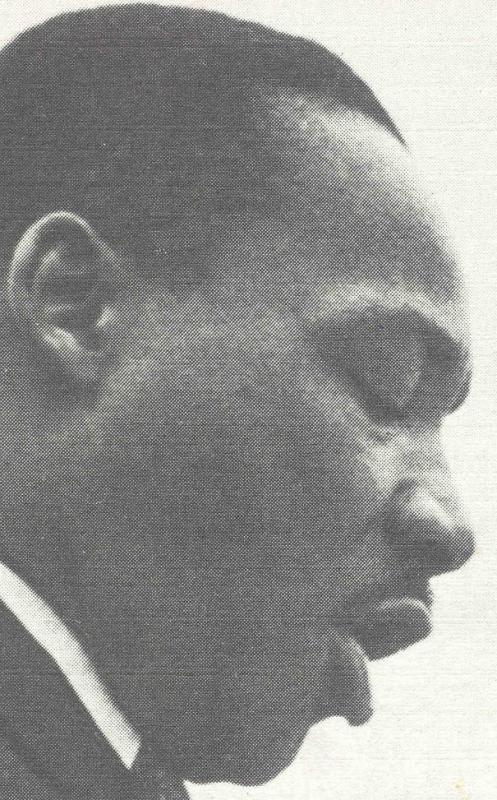 Recently the Holy Father has cited Martin Luther King, the apostle of nonviolence, as one of the Martyrs of the 20th century. Here is a timely reflection on his life. (Ed)
Recently the Holy Father has cited Martin Luther King, the apostle of nonviolence, as one of the Martyrs of the 20th century. Here is a timely reflection on his life. (Ed)
From 1929 to 1968 is only 39 short years.
Too short to gather the fruits of your labor.
Too short to comfort your parents when your brother drowns.
Too short to comfort your father when mother dies.
Too short to see your children finish school.
Too short to ever enjoy grandchildren.
Too short to know retirement.
Thirty-nine years is just too short.
From 1929 to 1968 is only 39 short years,
yet it's too long to be crippled by the manacles of segregation and the chains of discrimination.
Too long to stand in the quicksand of racial injustices.
Too long to receive threatening phone calls, often at the rate of forty per day.
Too long to live under the sweltering heat of continuous pressure.
Too long, 39 years is just too long.
From 1929 to 1968 is 39 short years, it's long enough.
It's long enough to journey all the way to India
to learn under a great teacher how to walk
through angry crowds and keep cool.
It's long enough to be chased by police dogs and lashed
by the rushing waters from the fireman's hoses because
you are dramatizing the fact that justice has a way of
eluding me and my brother.
It's long enough to spend many days in jail
while protesting the plight of others.
It's long enough to have a bomb thrown into your home.
It's long enough to teach angry violent men to be still
while you pray for the bombers.
It's long enough to lead many men to Christianity.
It's long enough to know that more appalling than bigotry
and hatred are those who sit still and watch injustices
each day in silence.
It's long enough to realize that injustices are undiscriminating
and people of all races and creeds experience its cruel
captivity sooner or later. It's long enough.
It's long enough to know that when one uses civil disobedience
for his civil rights, he does not break the laws of the Constitution
of the United States of America -- rather he seeks to uphold the principle
that all men are created equal;
he seeks to break down local ordinances that have
already broken the laws of the Constitution of the United States of America.
It's long enough to accept invitations
to speak to the nation's leaders.
It's long enough to address thousands of people on hundreds of different occasions.
It's long enough to lead 200,000 people to the nation's capital
to dramatize that all of America's people are heirs to the property of rights to life,
liberty and the pursuit of happiness.
It's long enough to enter college at 15.It's long enough to finish an earn several degrees.
It's long enough to earn hundreds of awards.
It's long enough to marry and father four children.
It's long enough to become a drum major for peace.
It's long enough to earn a Nobel Peace Prize.
It's long enough to give the $54,000 prize money to the cause of justice.
It's long enough to visit the mountaintop.
It's certainly long enough to have a dream.
"Oh the worst of all tragedies is not to die young, but to live until I am seventy-five and yet not ever truly to have lived." -Martin Luther King Jr
A Smile Goes A Long Way
By Mercedes Jaudines
Millions of Filipinos are working abroad hoping to help their families. To cope with their loneliness in a foreign land, some fix their attention on their work and some dedicate themselves in Filipino-organized activities.
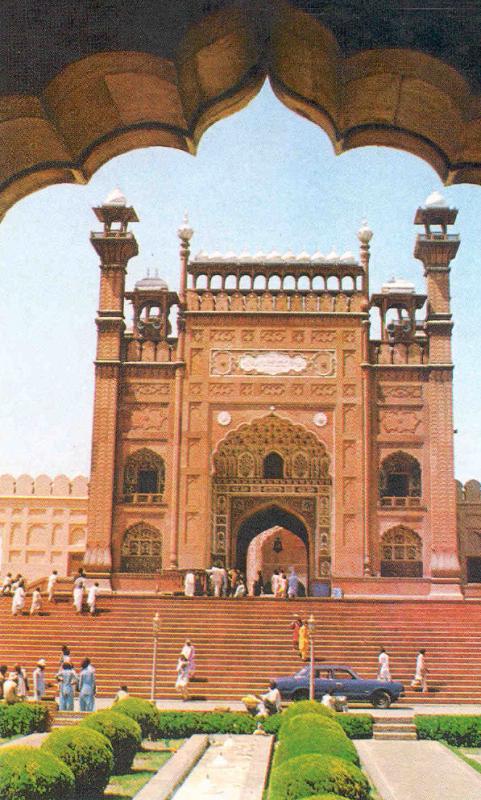
Here, Mercedes Juadines, an OFW in Pakistan tells of how she took part in organizing a Filipino community which is involved in helping their fellow Filipinos.
Life was not so easy when I first came to Pakistan in the last quarter of 1994. It was a totally different world in the sense that people, food, language and lifestyle were of a new culture. Being in a foreign land, I experienced the same feelings of loneliness and homesickness. To overcome all these and keep myself active aside from my routine work in the factory, I searched for new friends around.
Gathering the flock
It was then in the first quarter of 1995 when our Filipino community from the textile industry organized as singing group to sing during the Sunday Mass and a fellowship of Filipinos from Lahore, Pakistan. The same group started the prayer meeting during weekends. It was in July 1996 when the Filcom Lahore began doing some group projects and activities for the community. The first apostolate we had was the Filcom medical camp. We had our first medical outreach in Duphsaree Shadbagh. It was the beginning and later we have reached out to other poor communities of Lahore.
Where have we gone so far
Medical check-up, primary health care, drugs and medicines, nutritional supplements and health education were all given free through the generous support, fund raising and donations of Filcom members, expatriate friends and Pakistanis. We also hold a gift giving activity during Christmas as one of our charitable projects. My experience of being one with the Pakistanis, learning their simple way of living, the closeness and hospitality and the feeling of oneness in spirit brings joy to myself. We also had extended moral, legal, spiritual, medical and financial assistance not only to these poor Lahorites but also Filipinos within the community. Many have benefited from these projects which have created Filipino goodwill among Pakistanis in Lahore.
Filcom Newsletter
Inspired by the Holy Spirit and with the help of my missionary friends, my dream became a reality when the very first publication of the Filcom Newsletter came out in the second quarter of 1996. Our Filcom Newsletter is a dynamic communication link which creates a bond among Filipinos in different places in Pakistan. With our current news update, features and other relevant articles that are of special interest to each one of us, all are made possible by the unity of editors, staff writers and contributors.
Now on my fourth year in Lahore, I was elected as president of the Filipino community. There is a campaign on health awareness for Filipinos and their families for hepa-B immunization and other vaccinations. Filcom members’ benefits are well-defined in our Filcom Lahore resolutions mandated in August 1998. Filcom Lahore members are given IDs not only for identification but for some fringe benefits like discounts on participating outlets such as health and beauty shops, medical references (discount doctor’s fee, medicines), clothes shops, and many more. Monthly get-together, charity dinner parties were initiated not only for fellowship and camaraderie but also for the generation of funds to continually support our Filcom projects.
My experience with Filcom Lahore especially during our weekly prayer meetings mostly attended by the domestic helper’s group were also found beneficial. It made me get closer to our kababayans, allowed me to listen to their sharings and problems needing immediate action. It has changed my life. And most of all it made me a better person.
Drama Along The Ganges River
By Sr. Ching Madduma icm
Something beautiful is happening in villages along the Ganges River. It takes a Filipino to come up with something as noble as Sr. Ching came up with to help mentally handicapped people – these people who are quite normal in all other ways but mentally slow. As a result they have been relegated to a world of shadows. Sr. Ching has reinvented street drama to be performed by the people themselves in order to educate the populace to a more human attitude. Here we publish some photos of her pioneering dramas done along the villages of the Ganges River.
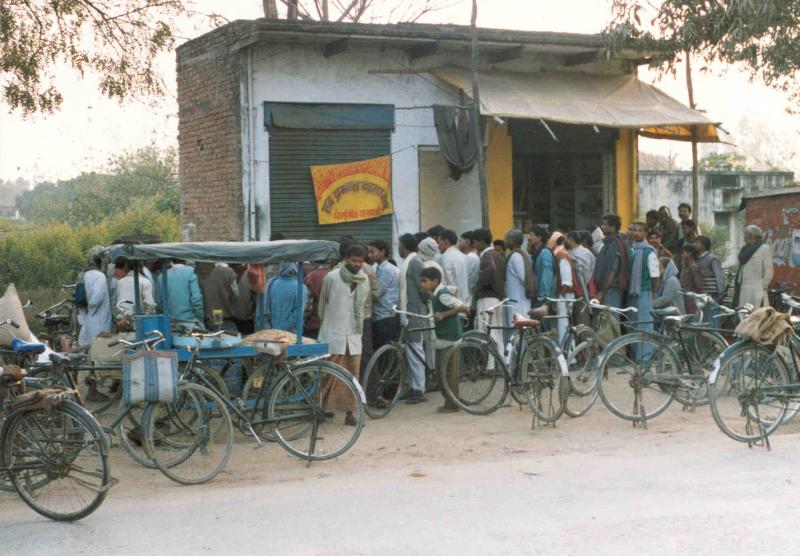
It is written: “The whole world is a stage; and we are all actors upon it!” and so it is through this that Sr. Conception Madduma, an ICM Sister from Isabela, Luzon, and missioned in India for over 20 years now, has taken these words and effectively applied them to her apostolic works in educating and taking care of people who happens to be slow.
The immediate platform for Sister Ching’s Dramas are the village roads and the waysides of the Varanasi District of Northern India. Here is the “holiest center of all Hinduism”. The actors are the local people: villagers, parents, teachers, persons who are slow. These street dramas of Sr. Ching are easily understood, and the result is that everyone is educated. Sister Ching has well oriented the street drama troupe and she says, “Handicapped people themselves are the best actors. They learn well; they perform well; they attract well.” All the actors are local people. The photographs shown here give ample evidence of their abilities and their educational acumen.
In ten villages located along the Ganges River banks, Sr. Ching has been the director, scriptwriter and sponsor of this special educational means. A new mission experiment is being tested. Much has been learned. Social education and awareness, as presented in these street dramas, have made an impact on those who have stopped to see, to listen and to become involved with the real life situations of many people who still live in a world of shadows.
Father Joeker

By Fr Joseph Panabang SVD
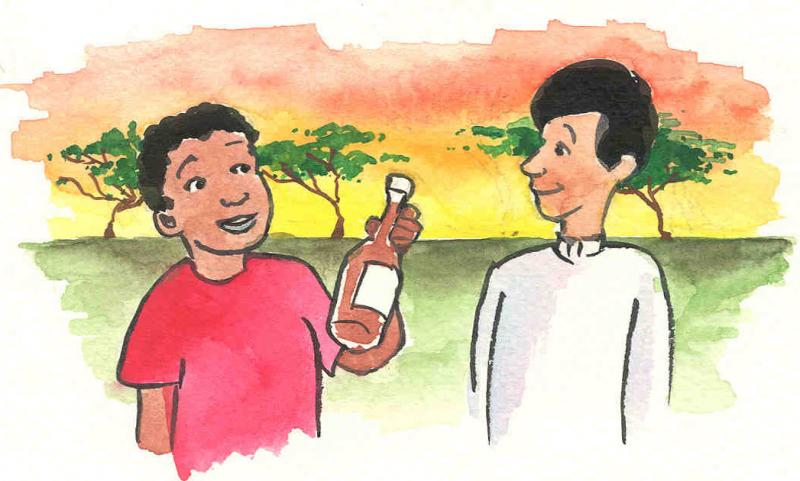
Drink and Be Happy
Kabi-kyerewase: (pronounced kabi-chi-ray-wa-see) is the name of an exceptionally strong local drink brewed from palm wine. Asked what the meaning of the name is, my guide said, “Kabi-kyerewase” means mother-in-law. Literally, if you drink that kind of gin, it makes you so drunk that your are not afraid to talk to your mother-in-law. The feared role of a mother-in-law seems universal.
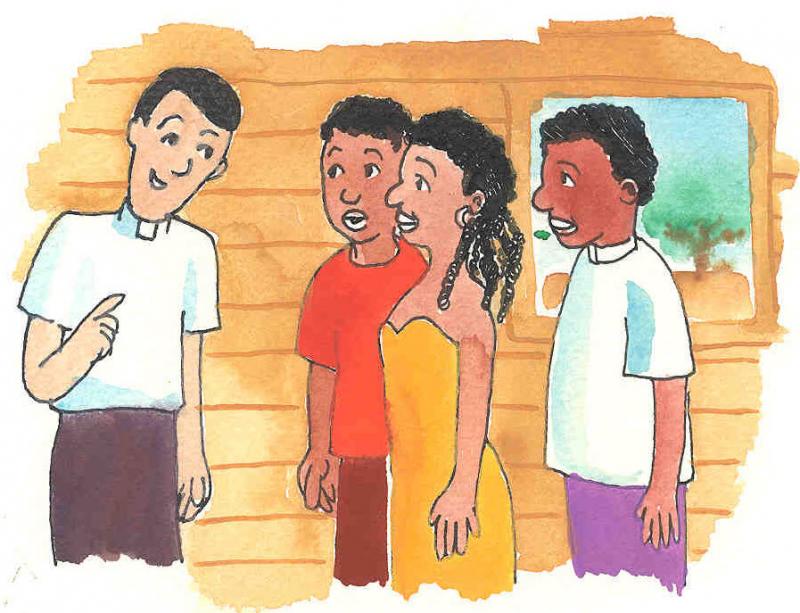
Queen of Sheba
A group of RENEW team were sent by the Bishop to Kintampo (RENEW is a movement trying to search for new ways of doing mission). They were Fr. Paul Yeboah, Mr. David Effah and Mrs. Rose Tetteh, a lay woman, who for some reason I do not know, was dressed like a queen. Fr. Paul did the introduction. “I am Fr. Paul and this is our catechist Mr. David Effah popularly known as ‘King David’ and this - “The Queen Sheba,” I interrupted before he could mention the name of Rose Tetteh. Whether flattered or simply shocked, Rose just did not know what to say.
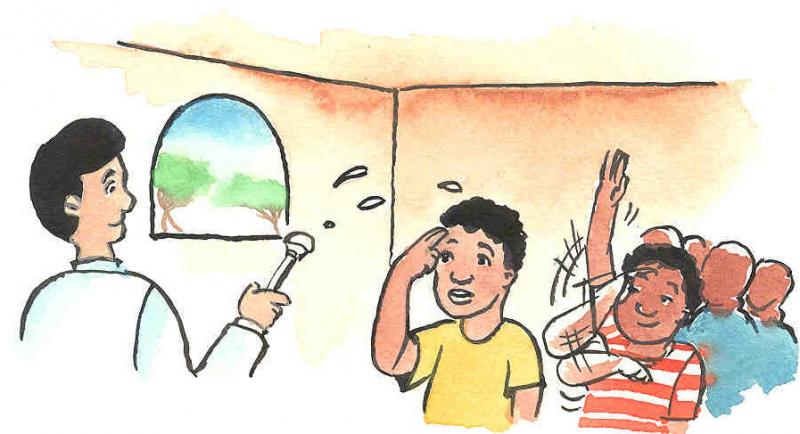
Learning the Sign
I was sprinkling with holy water the congregation in Portor village one Sunday Mass. As a practice they make a sign of the cross while being sprinkled. Trying to imitate his older brother making the sign of the cross, one child raised his right hand fully stretched and like a smart soldier, touched his left shoulder, then to his right ear then his forehead then back to his left shoulder. He almost fought fist to fist against his brother who made fun of him.
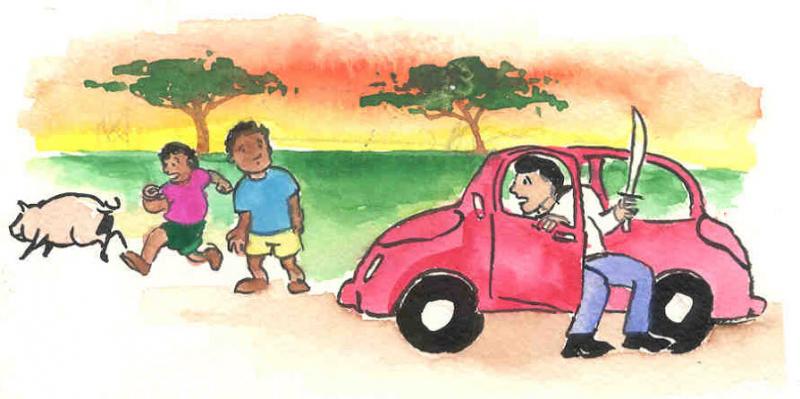
Snake on the Loose
After my mass in Apesika, a group of children were running after a pig, shouting, “Preko owuo!” The snake is devouring a pig is what I understood. Running to my car, I got my bolo and rushed to the scene asking, “Where is the snake!? Where is the snake!?” to my dismay the children were laughing. “What snake?” “I thought you said the snake is killing a pig?” “No Father, they are going to kill the pig,” clarified one of the bystanders. “Owuo” can either mean “snake” or to kill” depending on how it is pronounced, which made me realize later, how on earth could a snake devour a pig ... unless it’s an Anaconda?
Here Was A Strong And Brave Man
By Fr. John Keenan mssc
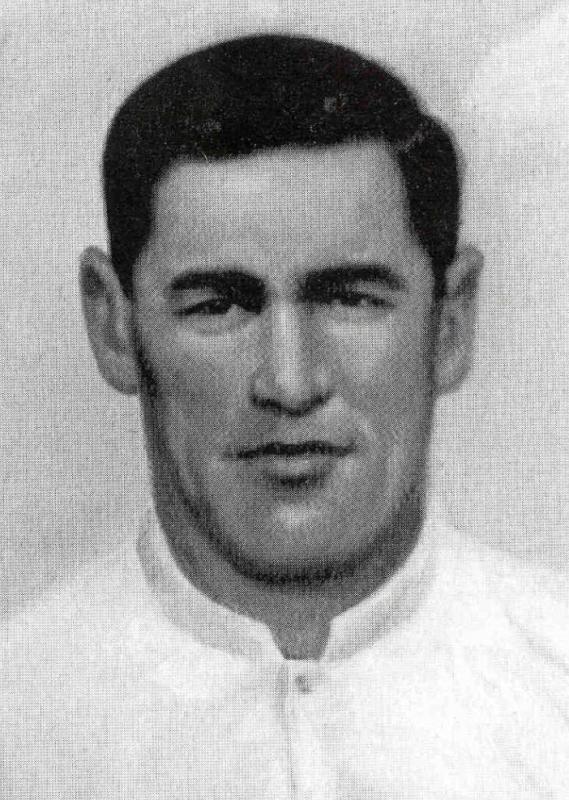 As a new century and a new millennium begins, Pope John Paul II is anxious that the lives and deaths of those who suffered and died heroically in the service of others be recorded and documented. The sufferings and death of Fr. Francis Vernon Douglas at the hands of the Japanese Military Police in the Philippines during World War II is one story that must not be forgotten. Fr. John Keenan, a Columban missionary from Ireland, tells us about it.
As a new century and a new millennium begins, Pope John Paul II is anxious that the lives and deaths of those who suffered and died heroically in the service of others be recorded and documented. The sufferings and death of Fr. Francis Vernon Douglas at the hands of the Japanese Military Police in the Philippines during World War II is one story that must not be forgotten. Fr. John Keenan, a Columban missionary from Ireland, tells us about it.
Fr. Douglas was tortured and is thought to have died near Paete, Laguna, in July 1943. Paete is a quiet country town nestled between the foothills of the Sierra Madre Mountains and Laguna de Bay, about 115 kms from Manila. Founded as a Christian settlement around 1580, its inhabitants are famous for their woodcarving skills.
Dawning of terror
On July 25, 1943, as usual the people were eagerly looking forward to their annual fiesta in honor of St. James the Apostle. However, the peace and tranquility of the town, crowded with visitors, was abruptly interrupted when the Japanese Imperial Army decided to zone off the area. It was cordoned off and no one was allowed to leave. All males from fourteen upwards were rounded up and incarcerated in the centuries-old parish church, famous for its beautiful woodcarvings and paintings. The Japanese were seeking out guerrillas and their collaborators who were carrying on a resistance in the woods of nearby hills. For several days, some 250 men were interrogated and tortured, deprived of sleep and mercilessly beaten until they gave information or died.
Caucasian Captive
A day before the fiesta, Japanese soldiers arrived in a truck with a tall, unknown Caucasian in custody dressed in a white cassock. He was tied to a lamppost and made to endure the hot tropical sun throughout the day. No one knew who he was, or where he came from. He was in fact, Fr. Francis Vernon Douglas, parish priest of Pililla, Rizal, some 50 kms away. Hours earlier he had been abducted from his convento and taken over the mountains to Paete.
Frank or Vernon (to his friends) was born in Johnsonville, Wellington, New Zealand, on May 22, 1910. In his youth he excelled at rugby and cricket, and later studied for the priesthood for the Archdiocese of Wellington. He was ordained on October 29, 1934. After an enjoyable and successful year as an assistant priest in New Plymouth, N.Z., he felt that God wanted him to become a missionary. He joined the Society of St. Columban and arrived in Manila in 1938. His first assignment was as parish priest of Pililla, where he struggled with the Tagalog language and tried to remain neutral between the kempeitai, the Japanese military police, and the Filipino-American guerrillas hiding in the hills around Pililla.
Just like Jesus at the Pillar
Meanwhile in Paete, the local chief of police, Basilio Y. Agbay, told one of his captors that the Caucasian man was a priest, but the Japanese soldier replied, “That man is a spy”. Exhausted after a day under the sun, Fr. Vernon was taken inside the church, by now a torrid dungeon. He was first taken to the sacristy where the terrorized peopled could hear moans as he was being tortured. Later, he was dragged to the baptistery where he was tied to the baptismal font, and again severely beaten until blood splashed on the surroundings. Stripped to the waist, clad only in white slacks with his torso and arms black and blue, oozing with blood, he was tied to the left post under the choir loft. All the torture and pain seemed to be concentrated on him while the 250 frightened men looked on. His bleeding and battered body immediately reminded the people of the scourging of Jesus at the pillar. “Yet ours were the sufferings he endured . . . He was harshly treated, but unresisting and silent, and he humbly submitted . . .” (Isaiah 53: 4-7)
For three days and three nights, he was forced to stand. One of the soldiers hit him on the forehead with the butt of his sword and immediately blood gushed out all over his face. The others were allowed to lie down and sleep. Throughout all this he uttered not a word. Instead, he kept his eyes on the altar and continued to recite the Rosary. A bowl of rice was placed at his feet, which he did not touch. His bloodstained cassock lay on the floor beside him. Finally, perhaps fearing that his end was near, he asked for the local parish priest to hear his confession. This was done in the presence of his torturers, lest they later force the confessor to break the seal of confession. Shortly afterwards, bloodied and bruised, he was bundled into a truck that sped away in the direction of Santa Cruz and Los Baños, where there were many prisoners of war, including priests and religious. He was never seen again.
In his silence
Why was Fr. Douglas singled out for such horrible torture? Did he refuse to talk in order to preserve the seal of confession or information held in confidence? As he was being interrogated in Pililla before being abducted, neighbors heard him remonstrate with the military police, “You have no right to ask me that question, and I cannot, in conscience, answer it.” Whatever the reason, one thing is certain, here was a strong and brave man who suffered in silence rather than betray his friends.
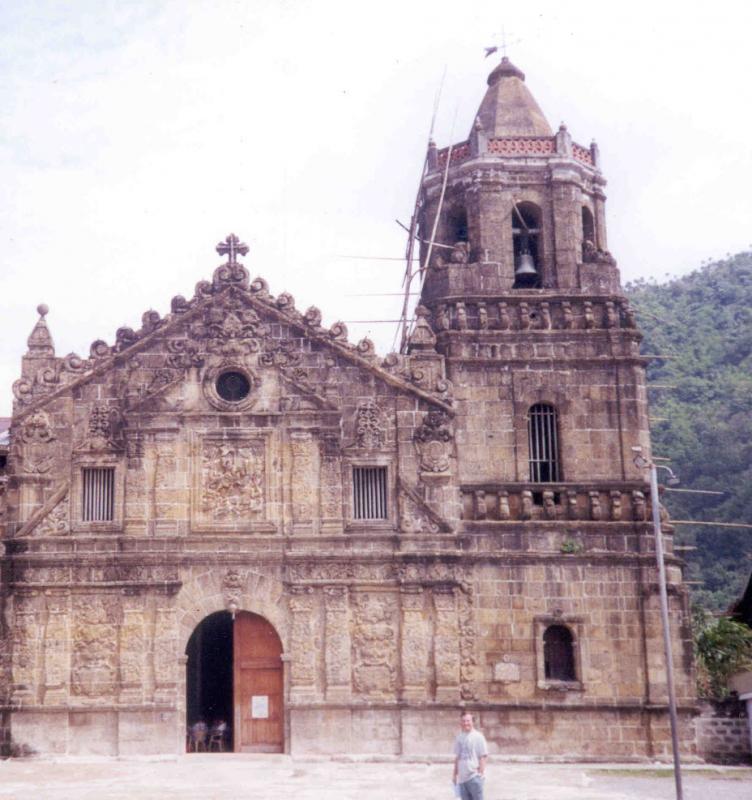
Savior of the town
An early report published in The Far East, the magazine of the Columbans in Ireland, in December 1945 stated: ‘What Fr Douglas suffered in Paete made a deep impression on the people of that town. The Filipinos say that he seemed to be like our Lord Himself, as he stood there, tied to the post in the Church, constantly beaten and ill-treated, but always with unquestionable patience. They expressed the belief that what he suffered made him a kind of savior of the town.’ From the time he was brought there, no Filipino received any ill treatment. On him were concentrated all the anger and hatred of the Japanese soldiers.
Today as the Church prepares a new martyrology we fervently hope that Fr Douglas’ name will find a place in that holy book. He may even become the first New Zealand saint.
In The Cocafeilds Of Colombia
By Cora Llamas
Missionary priest Fr. Jimmy Aguilar brings the Catholic faith to war-torn, poor communities of South America, where kidnapping, torture and violent death are a way of life. Fr. Demetrio “Jimmy” Aguilar’s faith has been tested by fire. Literally, and several times. As a foreign missionary of the Society of Divine Word (SVD), he has faced narco-terrorism in Colombia, endured Panama’s persecution of its Catholic Church, and stood with the people as the US troops rained fire on a dictator’s stronghold. In his service in God’s kingdom, this priest was almost killed twice. And at one point in his life, he lived with the knowledge that he could be arrested and killed without due process of law at anytime.
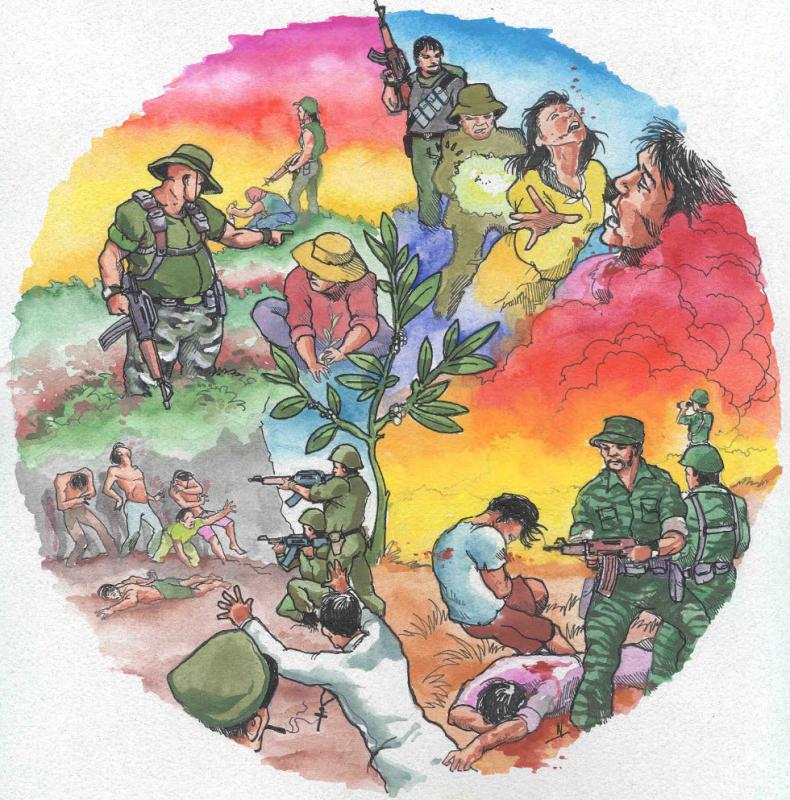
Why not the Philippines
Fr. Jimmy is currently enjoying a brief respite in his home country, after 15 years in the mission fields of Latin America. He will return to Colombia for possibly one last tour of duty. One might ask why he served in foreign missions in the first place, considering the need here at home. According to Fr. Jimmy, the faith of Filipino Catholics remains strong, as seen in the many young men who continue to enter the priesthood. In fact, the SVD has had to turn down some applicants because it could not accommodate their large number. Two reasons contributed to this growth: the empowerment of the laity and strong family ties in spite of encroaching modernization.
Longing for “something more”
The initial spark of Fr. Jimmy’s own faith was kindled in his own home. His parents who are from Lubang, Occidental Mindoro, were devoted Catholics who instilled the same piety among their six children. Jimmy graduated from his altar-boy duties to involvement in the Legion of Mary and Student Catholic Action. Later on, while as a twentysomething high school Math teacher, he continued teaching catechism and visiting the sick in hospitals. His heavy parish involvement did not take away the “longing for something more”.
Road to Priesthood
The road to priesthood was first shown to him by a German priest in his little town. Watching this man tend his spiritual flock everyday, away from the comforts of his own family and people, made the young Jimmy realize that “we have to share this faith with others if we are to be true to the call of the Gospel: Go out to the whole world, preach the Good News, baptize in the name of the Father, the Son and the Holy Spirit.” Since the Philippines is already a Christian nation, Jimmy thought, “What are we doing sitting here?”
His parents, surprisingly, did not readily accept his new calling. As the youngest who still lived under their roof, Jimmy was all they had. Their five older children had all made their own lives in Manila.
Not wishing to break his parents’ hearts, Jimmy entered the seminary without even saying goodbye. Reconciliation took a year, before his father could finally allow himself to visit his son at the novitiate.
First-level evangelization
There was little time to grieve as seminary life passed by quickly. Prior to his ordination in 1983 Fr. Jimmy applied for mission work in the forbidding continent of Africa. Instead, he was sent to Colombia to minister to parishioners struggling with adolescent pregnancy and drug addiction. Like all young missionaries, Fr. Jimmy had to learn the language, assimilate the foreign culture, strengthen the people’s faith and morals, and fight off bouts of loneliness. It was “routine missionary work”. He hungered for a challenge, his dreams for African mission work unforgotten, “I wanted first-level evangelization or bringing the Goof News to where it has not yet been preached. But in Latin America, the challenge was how to build Basic Christian communities. I always thought Africa was more difficult and challenging.”
The ‘challenge’ came at last
His prayers were answered with a transfer to Panama. A shortage of local priest in dictator Manuel Antonio Noriega’s territory forced religious orders to ask for reinforcement from other countries. The spiritual and moral burden was heavy. Government corruption had emptied the national bank and treasury, causing massive unemployment, economic collapse, poverty, and rising crime. An iron rule silenced the media and the opposition. Illegal arrests and imprisonments went unchallenged.
Noriega also declared the war against the Catholic Church. Freedom of assembly – even parish gatherings – was strictly forbidden. The strongman’s private army, the Battalion de Dignidad, infiltrated the congregations with spies who listened and took note of “subversive elements” in sermons. Suspect priests were marked with the “Traidores” sign painted over their church doors; they could be kidnapped, tortured, and salvaged. Panama’s own outspoken Archbishop, Msgr. Gregorio McGrath, was arrested, stripped naked, and beaten several times.

Living amid war
Fr. Jimmy awakened one morning to find the notorious “Traidores” sign looming over his door. He took it in stride. “Kung ano ang mangyari sa akin, it’s God’s will. Our concern was to do something to help ease the situation of the people.”
For years, the situation seemed hopeless, until the Americans launched their surprise invasion on December 19, 1989. “It caught us by surprise,” he remembers, “We were preparing for the old folks’ Christmas party. The next day at dawn, sumabog na ang city. We could see the fire in the city,mapulang-mapula. Tapos mayroon nang mga putukan. Na-cut-off ang television, radio, at angtelephones. And then we saw soldiers and parachuters, bumababa sa mga helicopters at eroplano.” The siege lasted three weeks. The Americans established military checkpoints and held a “benevolent” military take-over”. Fr. Jimmy found his town, Alcalde Diaz, the highest peak in the area overlooking Panama City, encamped with US Marines. To the chagrin of many, Noriega sought asylum with the Papal Nuncio, the Popes representative in Panama.
Dictator Surrenders
After 21 tension-filled days – “we were praying, ‘Monsignor Nuncio, please turn over”’ the dictator finally surrendered. The news sparked nationwide celebrations in Panama. America was hailed as a liberator. Fr. Jimmy kept his wits, anticipating the widespread famine that followed soon after Noriega had sin-phoned the funds out of the country, and his troops looted its department stores and supermarkets. Fortunately, the US cushioned the blow with a speedy, organized food rationing in cooperation with the Catholic Church.
Return to Colombia
Fr. Jimmy’s next assignment from 1995 up to the present was equally dangerous. His return to Colombia found the nation torn between the internal bloody warfare between the government and the drug cartel. The drug lords and their guerilla allies forced farmers to plant and grow their cocaine, killing those who refused. The government’s para-military forces, meanwhile, punished those who did obey. Colombia soon found itself under a “culture of death”. It had become their daily bread. Everyday, newspaper headlines screamed the massacres of entire families, including children. Kidnappings and bank robberies became rampant, as the guerillas and para-military groups turned to crime to augment dwindling funds. Whole communities were evacuated as bloody skirmishes broke out in the cities. The brother of a fellow priest was shot because of suspected complicity with the guerillas.
Peaceful zones
Fr. Jimmy found himself at the end of a gun barrel twice. As parish treasurer, he carried funds for projects allocated for the people's livelihood. In two separated incidents, he found armed men waiting for him as he came home from the bank. “Matatapang sila, hindi nagmamaskara. Kaya alam kong guerilla or para-military,” he sighs. Unlike in Panama, the Colombian Church is very traditional and conservative. Speaking out in the pulpit only discouraged the people. The only weapons left to the priests were prayers and their faith. Recently, the Colombian Church established “peaceful zones” that declare themselves neutral to both guerilla and government forces.
Passing on the Torch
The situation is still far from resolved as Fr. Jimmy went back to Colombia last year. After his tenure is over, he plans to stay in the Philippines for good to help pass the torch of faith to the new generations of priests. One truth he will teach his successors is to look at yourself. Can I be a sign of God's presence? What do I do? How do I live? In the meantime, he had to fight a war, its risks accepted. “When I embraced this kind of life, I was ready for anything.”
The Heart Goes Ahead
Yet, encouragement can also come from the battlefield. In Panama, one of Fr. Jimmy’s parishioners, Pablito, was a sick old man who never missed a Mass. Because the rustic, poor, barrio conditions did not have a permanent assembly place, church venues shifted from one location to another. Despite long miles he had to travel, Pablito was always present in the celebration of the Eucharist. Finally, taking pity, Fr. Jimmy told the old man not to attend anymore – the priest himself would bring the Eucharist to Pablito.
Pablito gently turned to offer down and gave precious advice to his spiritual pastor. “Father, when the heart gets here first, it is not difficult for the rest of the body follows.”
Like all soldiers of God, Fr. Jimmy’s heart goes ahead of him, in whatever mission field God sends him to.
Salamat sa Sunday Inquirer at kay Cora Llamas
It Happened On The Train
An interview with Russian dissident Alexander Ogorodnikov
Alexander Ogorodnikov was born in the Soviet Union in 1950. At age 17, he was a lathe operator at a clock factory. Three years later he began philosophy studies at the University of the Urals in Sverdlovsk, only to be expelled in 1971 for “a dissident way of thinking”. He then went to Moscow where he studied at the Institute of Cinematography. He founded the Christian Seminary in 1974. From 1978 he was a prisoner, finally released at the order of Gorbachev. Since his return to Moscow, he founded the Christian-Democratic Union of Russia and the Christian Mercy Society, a group assisting the hungry and homeless with a special concern for children and adolescents. The group following conversation with him was recorded in Amsterdam on April 25 following the Liturgy at St. Nicholas of Myra Russian Orthodox Church.

I was born in 1950 in Christopol, a town in the former Kazan government. We were raised in such a way that by the time we were 14 or 15 years old, we were ready to give our lives for Communist ideals. We were convinced that all these churches, which were only attended by old women, would sooner or later disappear together wit their babushkas.
A look backward
When the Bolsheviks took over Russia in 1917, they fought the Church not only because it was an institution of the Czarist regime, but because the Church was storming heaven. Did you know that in 1923 there was really a trial – a revolutionary tribunal that brought God to court? God Himself was tried! Lunacharsky and Trotsky were the two commissars who led the process and during this process they sentenced God to death. This was not a carnival – it was absolutely serious. God and the Church had to be crushed. In many of his letters Lenin stressed the importance of getting rid of priests. The whole fight against the Church and religion was carefully planned and very fierce. In 1932 there was the 17th party congress which not only produced a five-year plan for the economy but a five-year plan for achieving an atheist society. The plan was that by 1935 the last church would be shut down, and that by 1936 even the word “God” would have disappeared from the language!
Nightmare
I won’t describe for you all the horrors and all the tortures, and how many bishops, priests, monks and ordinary believers were buried alive or killed in other ways. What I want to stress is that to a great extent the Communists succeeded in converting Russia to Communism. And yet for all their success, hundreds of thousands of people defended the Church and became martyrs and the Church was not destroyed. The Church displayed a unique, quiet belief. Many priests went underground. In the 30’s, there were only three bishops still not in prison. Probably in the whole Soviet Union, in the 30’s just before the war, only 50 churches were still open. Thanks to this war, the fate of the Church shifted. People returned to belief. Stalin invited Patriarch Sergei to come from his small house on the edge of Moscow to live in the former embassy of the German Ambassador – one day in a log cabin with no telephone, the next in a mansion in the heart of Moscow. Many churches were re-opened, and two theological schools.
Still, though the Church had survived, when I was a boy we had no living contact whatsoever with the Church. None. Most of our generation came from atheistic families. One of my grandfathers was a commissar who died for the ideals of the revolution. Nonetheless, I was raised as normal Soviet child.
Long Road to Belief
In our school, there was a map of the world with flags marking every new country converted to Communism. We were singing revolutionary Cuban songs, and we were ready to die for Cuba or for any of these countries. How we moved from that attitude is something of a mystery. In the beginning it was just a kind of clash with reality, because we looked at real life and saw it didn’t match all those high ideals we were taught. First we thought, “Well, we live in the provinces. Maybe it takes a little longer for all these ideals to reach us,” though later, in Moscow, I could see the very same problems. Finally I was expelled from university because of my growing doubts about materialistic ideology.
First Gospel
When I had been expelled from the university I was attending in the Urals. I managed to get to Moscow and enter the institute. It was a kind of miracle that I was accepted. In that period one of my fellow students gave me a copy of the Gospels, though for a long time I didn’t read it. It couldn’t even touch it. The guy I shared my room with kept this money hidden in the Bible because it was a book that nobody dared to touch.
Forbidden Movie
One day, as part of our lessons, we were invited to a hidden place where forbidden films were kept by the film institute. You had to go by train to get there. By this time the New Testament was the only book I possessed that I hadn’t read, but that day I had it with me. There on the train I opened the book and started reading, immediately I had this very strange feeling. On one side my mind knew or told me that this is just a legend or fairy tale. But from my heart there arose a different feeling that became stronger and stronger that this is actually the truth, I couldn’t rationally understand that feeling. At that moment the conductor came into our carriage. Of course we didn’t have a ticket. We were all protesting students -- the film school was more or less the only place where dissent was tolerated. The way we dealt with these situations when we didn’t have a ticket usually was to start arguing with the man, saying things like, “Don’t touch the guy because he is in Nirvana, and if you touch him he will die, and you will be responsible.”
But for the first time in my life, I did something that rationally I couldn’t understand. I took out my money and wanted to pay. And wanted to pay also the fine for all of us. It was very strange, but I understood that the Gospels had done this to me.
At last we arrived and we walked through the woods towards the restricted cinema, first passing through several security posts. The first film we were shown was The Gospel According to Saint Matthew: it was a real shock for me. It helped me overcome all my irony and to accept the Savior, Jesus Christ. The background of the film was that Passolini, and Italian communist, who had stayed some night in some hotel, had the Bible on the bed next to him, read St. Matthew’s Gospel, and decided he wanted to make a film that would simply show every scene from this Gospel. He decided not to use professional actors. He found people on the streets. Jesus Christ was played by a Spanish student he happened to meet. After seeing this film, I started preaching to my colleagues. They were amazed because I had been such a cynical man, and here I was promoting the film as being the truth.
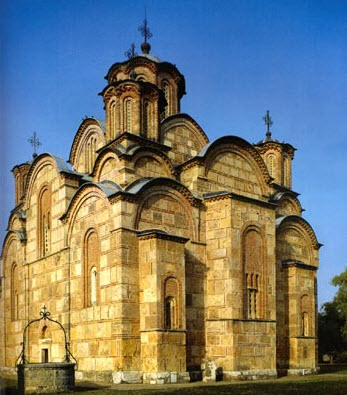
Christian outside the Church
Thanks to this film, I became a Christian and searched for a Christian way of life. I was a Christian outside the Church. I didn’t know what the Church was. I took my Bible with me and went to look for people thinking similar thoughts. Many people I met became the core of that Christian Seminary. This was the summer of 1973. We felt that we were missing something, that there was a mystery hidden somewhere, but we couldn’t touch it. The Church was far from everything we knew, but finally I made a big effort and went to church.
First time in the Church
It was a big church near the center of Moscow. I was amazed it was so crowded. It amazed me that so many of those attending the Liturgy were from the intelligencia. Despite there being so many people, I was able to walk toward the altar right through the crowd. I saw a bishop was celebrating. I didn’t understand what exactly was going on. Almost everyone was crying, I couldn’t understand why, but I was also crying, and when the bishop came out to serve communion, a certain power pulled me toward the chalice. I so happened, without thinking about fasting. I hadn’t eaten the whole day. Even the day before, I had been fasting. It was by accident. And I received Communion. After that I found out that it was Metropolitan Anthony of Sourozh, a bishop in London, who gave me communion. He happened to be in Moscow at that moment.
Land Of The ‘King And I’
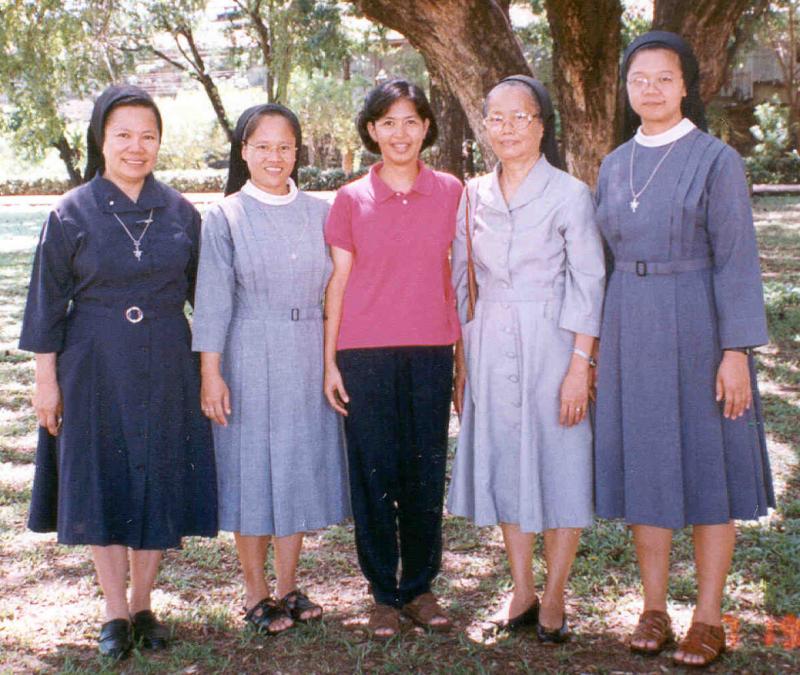
By Gee-Gee O. Torres
When I visited our Filipino missionaries in Thailand I couldn’t help remembering the movie The King and I. Two things came to mind: the desire that Thais had for western education and their determination not to allow western education to destroy their wonderful culture. And to my surprise that is precisely the enterprise which many of the Filipino missionaries in Thailand are engaged in: helping in the field of education while respecting and developing the native Thai culture. Let me refer in particular here to the Augustinian Sisters who I visited in the Northeast in Thare, the largest Catholic community in Thailand.
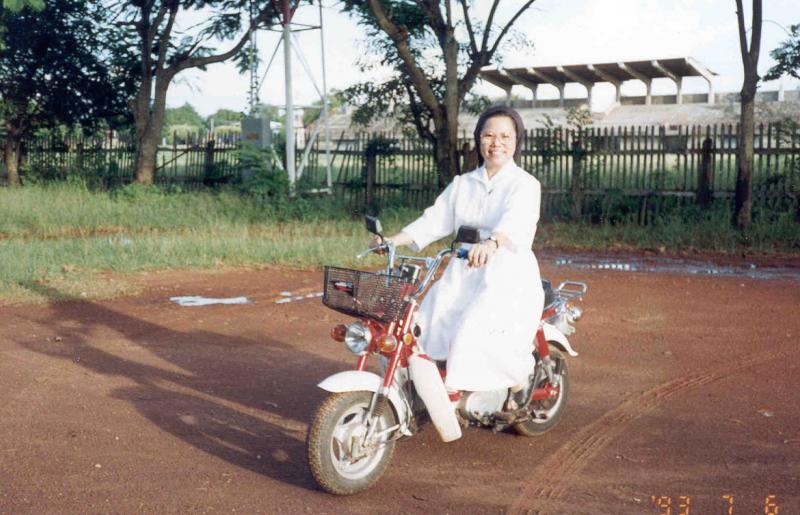
Felt at Home
The Augustinian Sisters were very warm and welcoming. I really felt at home with them maybe because we were speaking Ilonggo all the time. Sr. Maritz, Eden and Veron are from Negros, too. I enjoyed listening to their funny stories. Sr. Maritz said that one day she went to the market confident with the new Thai word she learned. She wanted to buy a pineapple so she told the woman selling at the market, “Sukraprok.” The woman seemed not to have heard what she said so she repeated the word again and again. Then finally the woman raised her voice and told her to go away. When she went home, she shared what happened to her Thai friends, only to find out that “sukaprot” means dirty. Pineapple is saparot in Thai. Well, you win some and you lose some.
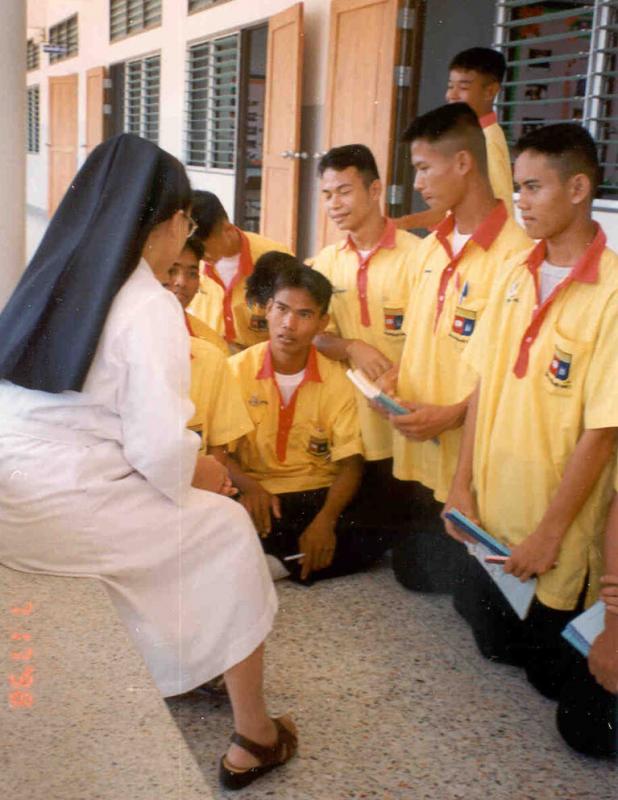
Open Doors
The Sisters are staying at the third floor of the Catholic Center in Thare. I occupied the guest room. When I was about to sleep during my first night at the Sisters’ house I could not lock the door. So I went to see Sr. Maritz and told her of the little problem. She said, “Don’t worry. We normally don’t lock our doors here except the one in the main entrance.” But, back at home Mom would always remind us to make sure all doors are locked before we go to sleep. Sr. Maritz must have sensed that I was still worried. She accompanied me back to my room and assured me that it’s alright. I tried my best to get a goodnight sleep but to no avail. I guess, this is what they call inculturation.
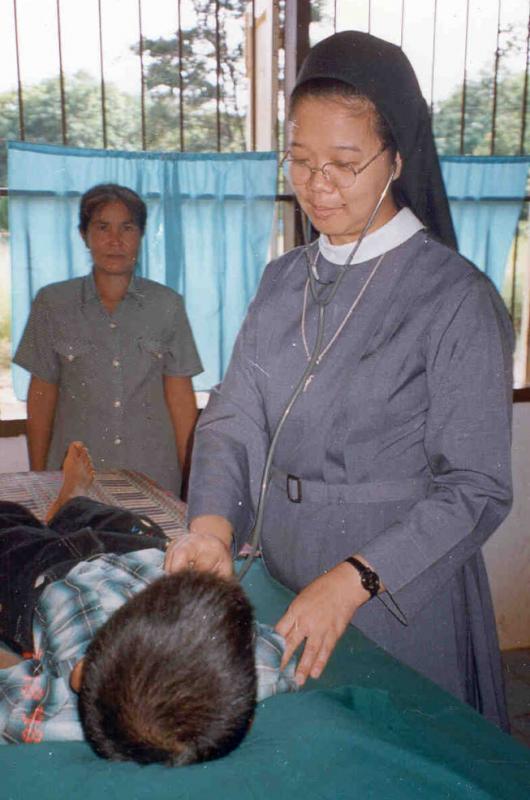
Shoes Off
The next day Sr. Veron and I went to St. Joseph’s School with Sr. Maritz and Eden. Sr. Veron showed me around the campus. She wasn’t on duty as a nurse at the community clinic at the time of my visit so she had some free time to accompany me. While we were going around I was surprised to see many pairs of shoes outside the classroom. Seeing my puzzled face, Sr. Veron explained right away that it is a custom in Thailand to remove your shoes when you are entering a house as a sign of respect. Part of the culture which the Filipinos Sisters have adapted to.
Then another sight caught my attention. Sr. Eden sitting on a bench along the corridor surrounded with students kneeling on the floor. When I asked her why they were kneeling, she said it is a sign of respect. When a teacher is talking to the students, the heads of the students should be lower than the teacher because she is senior to them. So this must be why in the movie the King and I Anna had to keep her head always lower than the King. (Sr. Eden has been re-assigned to the Philippines as principal of La Consolacion College Elem. Dept. in Bicol.)
We also went to the classroom where Sr. Maritz was having her class. We were still about five meters away from the room and we could already her voice. When we reached the classroom we saw Sister marching up and down the flat form while singing with the students “once a farmer had a dog and Bingo was his name...” With a teacher like this – full of life – who would like to miss a day in school?
When Sr. Eden and Maritz’ classes were over, the four of us went to the other Sr. Joseph’s School in Sakon Nakhon to see Sr. Imay in action. When we arrived she was teaching her students English and at the same time integrating values formation. Sr. Imay is now back in the Philippines. Her new assignment is teaching in St. Francis Parochial School in Talisay Camarines Norte.
Looking back on my visit to the Augustinian Sisters and indeed to so many of the ten different Filipino congregations, I recall how they were so determined not to be part of a shallow ‘hollywood-ization’ of Thailand but to be among those who strengthened this ancient oriental culture so that it can walk into the 21st century with its head up and proud of its traditions.
Srs. Maritz, Eden, Veron and Imay, thank you for the time you shared with me. Despite your busy schedule you still found time to accommodate me and bring me to visit the land of the Blessed Martyrs in Song Kohn and to Mukdahan where I got a glimpse of Laos and the great Mekong River.
And Special thanks to Fr. Anthony Weeradit, Rector of the Fatima Seminary, who was very kind to drive us to these places.
Again salamat gid.
Pink Sisters
By Sr. Mary Hermenegildis sspsap
In 1923 Bishop Alfredo Versoza invited our congregation to establish a convent and chapel of Perpetual Adoration in Lipa. Mother Mary Michael Sent 10 German Sisters. Here, our Sisters prayed, worked and sacrificed in order to fulfill their mission: more priests for the Philippines. However, unaccustomed to the tropical heat, the Sisters continued their Eucharistic apostolate in a cooler Climate since their health suffered considerably.
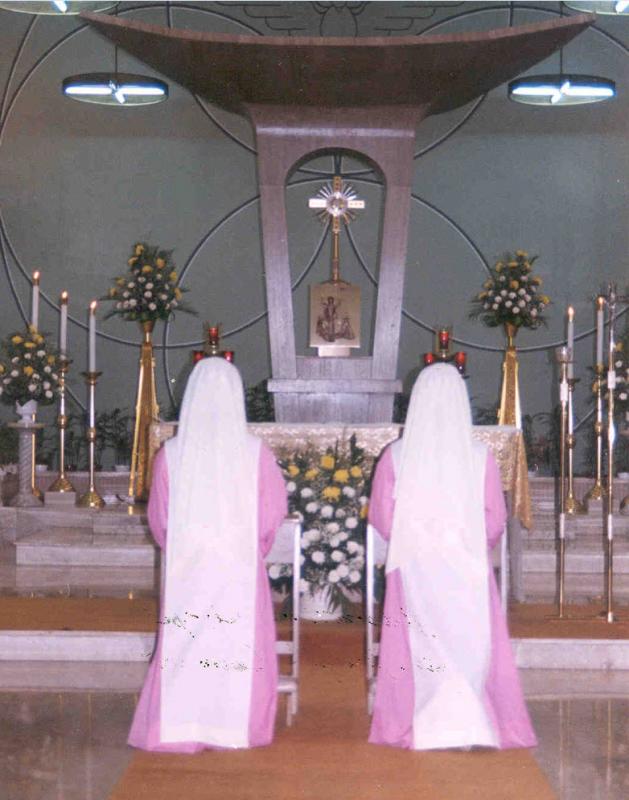
A new site was found in Baguio – Mount Tomas. The new Convent of the Most Blessed Sacrament flourished with new members.
Our most recent missionary venture is in Kuwu, Ruteng, Indonesia headed by Sister Mary Clare with two Indonesians who were trained in Tagaytay and four other Filipinos from the Cebu, Aklan and Tagaytay convents. We feel tangibly the guidance of the Spirit as more native candidates join this faith community.
Five years later, Mother Mary Aurora and her council accepted the invitation to start another apostolate in faraway Poland, the birthplace of our beloved Holy Father, John Paul II. Four Filipino sisters from our immaculate Convent in Aklan headed by Sr. Mary Hermenegildis were chosen for this new foundation. The Adoration Convent of the Divine Word in Nysa, Poland was blessed and inaugurated on October 28, 1955. Several young women from Poland and Slovakia were inspired by the Holy Spirit to dedicate themselves to a life of perpetual adoration, penance and prayer in our cloistered Nazareth life.
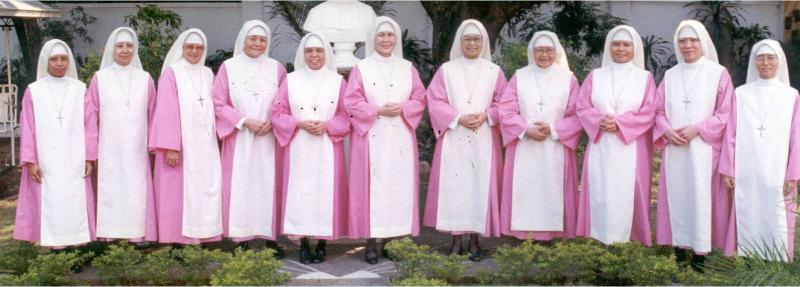
Blessed Arnold Janssen, our Founder, with deep insight said: “We adore not only the glorified Lord, but through him in the Holy Spirit, we also adore the Father. We unite ourselves with his loving surrender to the Father for the Life of the world. In Adoration, we enter into the intimate Father-Son-Holy Spirit relationship – a true relationship of love which is our vocation and mission.
Mary is our model, the model of a true disciple of Christ. We venerate her in our congregation under her title Immaculate Spouse of the Holy Spirit for she was even open, receptive and responsive to Him.
Pulupandan Rejoices
By Annabelle Badilla
Everyone was quiet and solemn watching the young priest lie face-down on the floor while the choir was singing the litany of the saints. Then afterwards all the priests present laid their hands on Ricci’s head, passing on to him the power of priesthood.
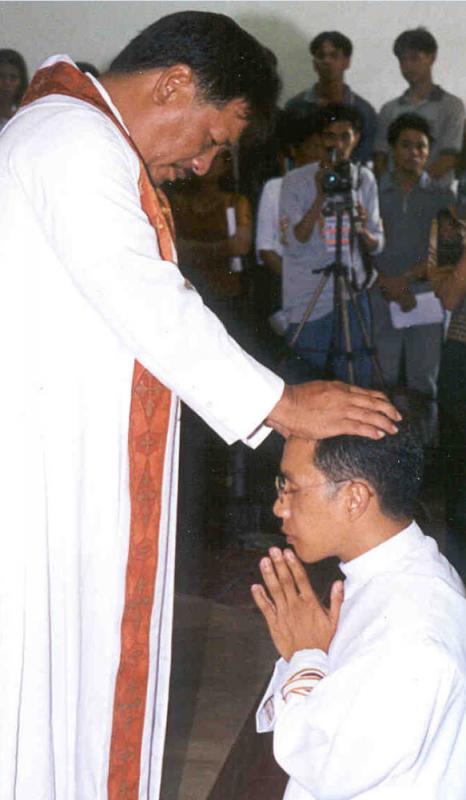
Ricci Reymond Pajarillo spent 11 years in the Columban Seminary two of which were spent in China for his Overseas Training Program. Then he came back to the Philippines for his ordination. On June 10 the Our Lady of Lourdes Parish in Pulupandan, Negros Occidental was packed with parishioners, well-wishers, relatives and friends of Ricci as he gave his life to God. Columban Fathers from different parts of the country and from China and Ireland and diocesan priests arrived to take part in this unique moment. The ceremony started at 10 am. Bishop Camilo Gregorio ordained Ricci priest.
It was a very touching moment when Ricci approached his mother to give a sign of peace and embraced her with a love an only child can give. Ricci just managed to hold back his tears while his mother failed to hold back hers. It is surely difficult for a mother to let go of her only child but she had to. Ricci is being called by the Lord to “go and teach all nations the Good News.”
Fr. Colm McKeating, Regional Director of the Columban Fathers, sealed the whole activity by thanking Ricci’s parents for “the gift of Ricci” and expressing his gratitude to the parish priest Ernesto Majellano and people of Pulupandan who beautifully prepared everything for Ricci’s ordination.
Ricci’s mother who is a well-known photographer in Pulupandan and who never misses to cover any occasion did not hold a camera this time - against her will. Her friends guarded her all throughout the ceremony. Nevertheless during the entire ceremony cameras flashed her and there proving how important the occasion was to everyone. However, a photographer is a photographer. During the recessional march, Ricci’s mother managed to get hold of her camera and took a shot of the remaining part of the ceremony.
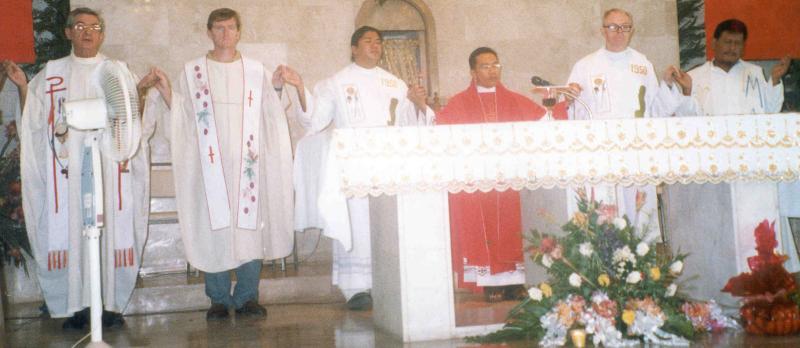
Cries of delight filled the church when Ricci invited everyone to a lunch prepared just beside the church, which turned out to be a real feast! Who would not rejoice over a promising young man dedicating himself to God forever?
Time To Turn Down The Heat
By Fr. Sean McDonagh mssc
 If asked to list the problems that need urgent attention in the world today few people would name global warming. One of those who did, back in 1990, was Pope John II when he warned that the “greenhouse effect” had reached crisis proportions. This is not a solitary or alarmist voice. Other people, especially scientists, are also extremely worried abut the long-term effect of global warming on the planet and the peoples of the earth. In the run up to the Climate Conference held in Kyoto, Japan, in 1997 more than 1,500 of the world’s most distinguished scientists signed a declaration urging leaders to act immediately to prevent the “potentially devastating consequence of global warming.”
If asked to list the problems that need urgent attention in the world today few people would name global warming. One of those who did, back in 1990, was Pope John II when he warned that the “greenhouse effect” had reached crisis proportions. This is not a solitary or alarmist voice. Other people, especially scientists, are also extremely worried abut the long-term effect of global warming on the planet and the peoples of the earth. In the run up to the Climate Conference held in Kyoto, Japan, in 1997 more than 1,500 of the world’s most distinguished scientists signed a declaration urging leaders to act immediately to prevent the “potentially devastating consequence of global warming.”
While life would not be possible without a warm atmosphere the appropriate temperature balance is a delicate one. The present problem has its roots in the huge increase in the burning of fossil fuel which began with the industrial revolution in the second half of the last century. The multiplication of industries meant the release of greenhouse gases into the atmosphere. (These are gases which produce an effect somewhat similar to that of glass in the greenhouse, Ed.) Scientists estimate that the levels of carbon dioxide, one of the most important greenhouse gases, has increased by 255 since the beginning of the industrial revolution. Unless drastic action is taken a further 30% increase is expected in the next 50 years. This could lead to an average increase of between 1.5 and 4.5 degrees celsius in global temperatures by the year 2030.
What will happen then?
So what? Global warming brings very serious consequences. A slight rise in temperature would melt much of the ice-sheet in the Arctic and Antarctic and lead to a significant rise in the level of the ocean. The impact on people in many pacific islands, low-lying areas like Bangladesh or the Nile Delta would be catastrophic. Tens, possibly hundreds, of millions of people would be displaced. Global warming will also bring much more erratic weather conditions – a considerable increase in the frequency and intensity of hurricanes and typhoons.
Scientists also predict that if the present trend continues rainfall patterns will change dramatically. Some major croplands like the prairie lands of North America will most likely be lost because of drought. Deserts will also increase most notably in Africa. The disruptive impact on agricultural could lead to famine in many Third World countries.
Action is needed now
Global warming will continue to plague the Earth unless Northern Countries drastically reduce their consumption of fossil fuel. Is this possible? It is, but it will call for energy efficiency, good public transport and a drastic cut in the use of fossil fuel. Specific and legally binding targets for reducing carbon dioxide emission need to be set.
An effective way to achieve this would be the introduction of “a carbon tax”. The price of fossil fuel should reflect the real cost of extracting and consuming oil or coal on human health and the environment. Those in favor of this approach point out that an energy tax would help stimulate new inventions, promote energy efficiency and compensate people in the Third World who, by not burning fossil fuel, have helped to lessen the global problem.
As part of its prophetic witness the Church must challenge the individuals and the institutions who are primarily responsible for the global warming to change the profligate way they use energy. Pope John Paul II has called for “simplicity, moderation and discipline, as well as a spirit of sacrifice ... lest all suffer the negative consequences of the careless habits of a few".
To Be Or Not To Be?
By Fr. Dave Cribbin mssc
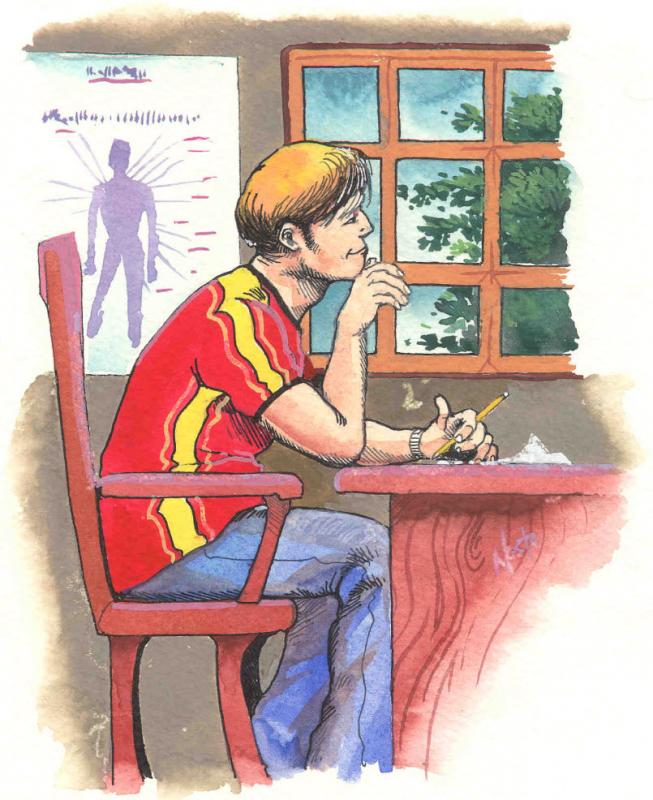 Between the ages of 10 and 17 my ambition in life changed many times, from truck driver to scientist, to photographer, to engineer, policeman, soldier – until one day I came home from high school and told my family that I was going to join the Columbans and become a missionary priest.
Between the ages of 10 and 17 my ambition in life changed many times, from truck driver to scientist, to photographer, to engineer, policeman, soldier – until one day I came home from high school and told my family that I was going to join the Columbans and become a missionary priest.
They could not believe my decision and in fact they even found it amazing. Because especially during my high school years I was never what you might call a religious person. In fact, each Sunday morning my parents had to pull me out of bed to attend Mass. I went but it was against my will. So you might ask why this sudden interest in becoming a missionary priest. What happened to me?
Well, it was quite simple really. In final year in high school I was very confused as to what to do with my life. I heard some of my classmates making plans to emigrate. More were choosing various courses in college while others were hoping to get jobs straightaway. So after a lot of soul searching I decided to become a policeman. So after a lot of soul searching I decided to become a policeman. I was interested in this way of life. I felt I would be a good one and that I would also be happy. After I had made the decision I was relieved to have my future sorted out. At least that is what I thought. Shortly afterwards Columban Nicholas Murray came to my high school to give a talk about his life as a missionary and to see if any of us felt that God was calling us to be come missionary priest. I knew that He wasn’t calling me as He had already called me to be a policeman. My life was already sorted out, or so I thought. I still didn’t mind attending the vocation talk though because it meant that we had a class free from Mathematics.
My messy way
Over the previous months priests from different congregations and orders gave us vocation talks but some were not interesting; they only confirmed my wanting to be a policeman. Everything was going according to my plan until a Columban entered my life. I can still clearly remember that visit to the school from that Columban and the impression he had made on me. He was honest, down to earth, human, open and enthusiastic. He spoke about missionary life as it was and didn’t try to make the life sound more glamorous, heroic, exciting or easy than it was. The man’s obvious happiness and contentment in being a priest and his passion for mission really struck me. However, as much as I was challenged and moved by his sharing, I still wanted to continue on my own messy way. After all I had other important things to do and criminals to catch. I still had to go to college, save money, build a house, get married and have children.
After the vocation talk
However I do remember saying to myself that if ever I was to become a priest, I’d join the Columbans because of the work they are doing and their being down to earth. Alas, my nice, comfortable, organized plan for my life was never again the same after that vocation talk. I couldn’t get the Columbans or missionary priesthood out of my head. This was really frustrating and annoying me because I didn’t want to become a priest and I certainly didn’t want to live abroad because I am very close to my family and I love Ireland.
In the following weeks I got more and more frustrated until suddenly I hit upon a brilliant plan that would solve everything. I wrote a letter to the Columban inquiring about their next search-in or vacation weekend to which I received a prompt reply. A few weeks later I headed off to spend a weekend with the Columban priest, which according to my plan, would prove that this wasn’t the life for me. I would discover just how unsuited I was to missionary priesthood and therefore continue on my merry way as a policeman.
Me? A missionary priest?
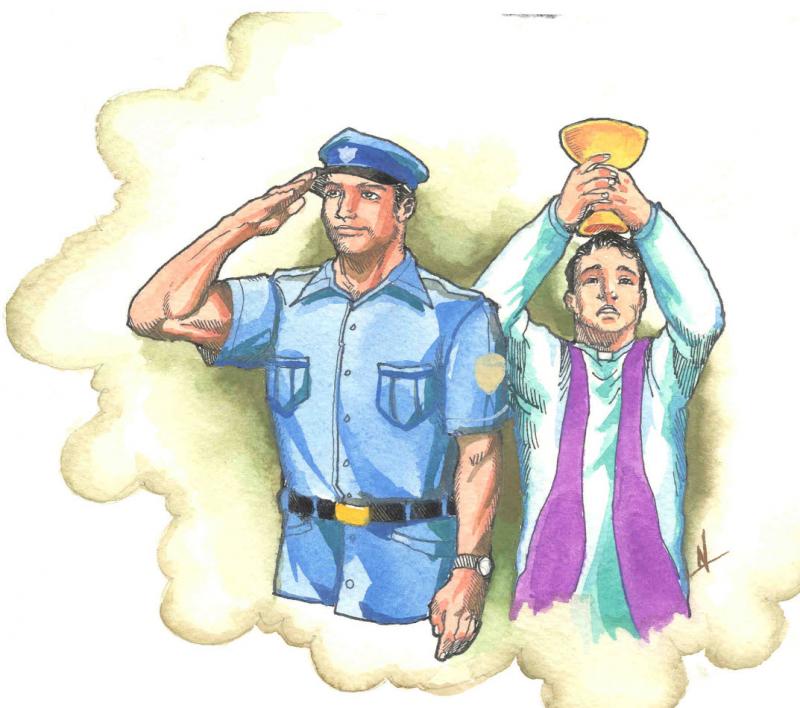
That was the plan but it backfired! Two days later I left the Columban House convinced that God was calling me to be a Columban missionary priest and realized that I myself wouldn’t be content unless I gave it a try. That evening I arrived home and told my parents, who just stood there looking at me, with their mouths open in shock. My brother and sisters started laughing as they found the whole idea so funny. They thought I was mad. However, when they saw that I was serious and really wanted to give it a go, they were fantastic and gave me their full backing and support.
At last my ordination
Six months later, on September 21, 1987, I joined the Columbans and was ordained priest on January 4, 1997. After ordination, I was assigned to Mindanao, Philippines, where I had spent 2 years training as a student. I asked to be assigned to the Marawi prelature in Lanao del Sur which is 95% Muslim. For the past two years I have been here in Our Lady of Peace Parish, Malabang, settling in and finding my feet in this very different culture and world. In a few months time I’ll be finishing up here in this parish and moving into a Maranao barrio for a year or two in order to learn Maranao, the language of the local Muslim area. This is where my interest lies, Muslims-Christian dialogue and I feel God’s presence very much with me here.
To conclude, I am delighted to be here in the Philippines and to be living in the Muslim-Christian area. Looking back, I have no regrets about the decisions I have made and I would have made the same ones all over again.
Reflection: Your Dream
If you have a dream alive in your mind, bring it to the world, give it life. Too often the treasures which are ours alone to give are never given a chance to grow. We each have a unique gift to bring to this world. It is our purpose in life to offer this gift for even if only a few people benefit from our offering the world is then a better place to live in.
To Search is to Find

For some time we have been asked to put in Misyon a section on Questions which our readers would like raised. We are not too sure how appropriate our suitable this is, so please let us know if these questions have been of any help to you. We are calling this article To Search is to Find because we do not have the answers to every question in the universe – but the very asking of the question is the beginning of the answer.
LEAVE THEM ALONE

Misyon sometimes contains stories of tribal people. Are these people not happier left to themselves? Sometimes their cultural and religious practices are more environmentally friendly than our own.
You have two questions here. Yes, they might be happier left on their own. No one can really tell. But in today’s world inevitably they will be invaded by the 21st century. Which is better: to be made feel small, ridiculous, irrelevant and uneducated by the shining consumer culture of the West or to be made feel the dignity of being the children of God and the brothers and sisters of Jesus with the true hope of Life? That is what the Good News offers them. Apart from that as Christians we are bound to share the Good News. Someone once describe a missionary one who comes when he is not wanted and leaves when he is wanted. It is quite true that tribal people often have very environmentally friendly cultures and we should be ready to learn from them. I think that is what Misyon tries to do.
POLITICS AND RELIGION
Where did the Lord tell us to mix politics and religion? Is not our salvation for the next world and for things spiritual? Your magazine continually brings up political matters.
It does, though not exclusively. The reason is that though personal internal conversion is the first aim of the Good News it should have social consequences. In Catholic teaching, there is a social gospel which means that justice for the poor is an essential part of the Good News. If this is sometimes abused by some it still does not take away our obligation to have a social conscience. Popes have been explicit and detailed about this even down to giving clear teachings on things of labor unions, family wage, and death penalty. Christians should keep a balance between the two approaches (personal conversion and social transformation) knowing that his or her social impulse will only endure if rooted in the Gospel.
SABBATH DAY
Recently the Pope wrote a letter about keeping the Sunday holy. Does that mean we cannot work on Sunday? Should stores be open on Sunday?
Yes, the Holy Father has written a beautiful letter on the holiness of Sunday. It does not obligate us under pain of sin not to work, but it does challenge us to make Sunday a holy day and therefore work should be an exception. Nor should we ask people to work for us on a Sunday. It is very sad when a culture loses the sacredness of Sunday. Everybody loses.
Should shops be open on Sundays?
Some small foodshops may need to be open for emergencies but I think it is sad when the big shopping malls are all open on Sundays. It means a huge number of people can never go to Church or be off on the day that their companies are off. So all praise to those mall owners who make the sacrifice of closing their malls on Sunday. I’m sure the Lord will not let them down.
PS. The Apostolic letter is called Dies Domini and is produced by St. Paul’s. Do try and read it.
CANNON OF SCRIPTURE
How many books are there in the Bible? I hear conflicting numbers.
The Bible contains 72 books. This was decided by the Church Councils around the 4th century. So the Catholic and the Orthodox churches keep that number of books. In the 1st century AD as Christians and Jews grew more and more apart the Jewish community made cannon of their books especially those of Greek influence. In the 16thcentury, Martin Luther, founder of Protestantism, reverted to the Jewish cannon of the 1st century AD and so excluded the books that they excluded. The result is those following Luther’s tradition have only 66 books though some of them include the extra 6 books as an appendix.
Which is more important Scripture or tradition
Imagine for a moment how the scriptures develop. First, you have Jesus delivering His words, viva voce from His own mouth. Second, you have the Christian community as described in the Acts of the Apostles preaching Jesus’ words and applying His words to the various problems of the communities as you have in the letters of St. Paul. Then you have the various traditions abut Jesus being written down in four gospels. The gospels pull together these verbal traditions about Jesus being written down in four gospels. The Gospels in a sense are tradition written down. But that’s not the end of it. How did the early Christian tell the difference between one holy book and another? Which were inspired by the spirit and which were not? They had to go back to tradition and rely on the decisions of the Church. Once decided by the community, these books were called the Cannon of Scripture and they became a normative guide for the Church. So scripture and tradition work together all the time helping us to be faithful disciples of the Lord.
MARY THE MOTHER OF GOD
How can we call Mary the Mother of God? Is she not just the mother of the human person of Jesus not the mother of His divinity?
May I quote from Beginning Apologetics by Chacon and Burnham:We call Mary Mother of God because she gave birth of Jesus, who is God. We follow the Spirit-filled Elizabeth who declares in Luke 1:43 “How does this happen to me that the mother of my Lord should come to me?” Jesus is true God and true man: two natures in one undivided Person. By being the Mother of Jesus, Mary is also the Mother of God, the Second Person of the Holy Trinity. Mary did not give birth merely to a human nature, but to a person, the Son of God who took from her flesh a pure human nature. Lk. 1:35: “The child to be born will be called holy, the Son of God.” Gal 4:4: “God sent His Son, born of a woman.” If Jesus is truly God-made man, then Mary is truly the Mother of God. Obviously, Mary did not exist before God. Jesus is the Son of God from all eternity, who became also the Son of Mary in time.
LAY MISSION
In Misyon, you frequently have articles on lay mission. Does that mean that even married people can go on mission?
Yes, Every lay person is called to share the Good News and there are many different organizations which help people to dedicate themselves exclusively for a time to this work if that's what they feel called to. For example:
1. Philippine Catholic Lay Mission
Biboy Dicen
78 Simon Street, 1114 Quezon City
PO Box 2717, 1099 Manila
2. Columban Lay Mission Center
Sr. Pat Zandrews
34 Rosario Drive, Cubao Quezon City
These lay mission organizations have rules and conditions. If you wish to join them, they will send you their brochures.